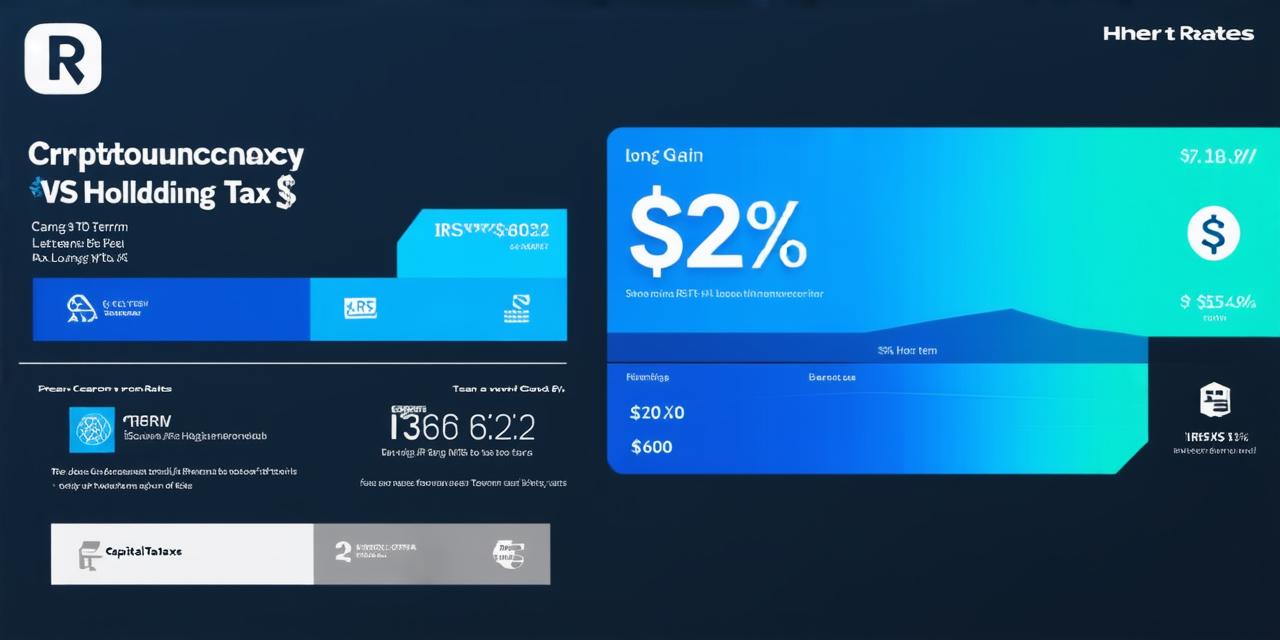Cryptocurrency is becoming an increasingly popular form of investment and financial transactions. However, as with any financial asset, it’s important to understand the tax implications of investing in cryptocurrency. In this article, we will discuss when you should report cryptocurrency on your taxes and provide tips for staying compliant with IRS regulations.
Understanding Cryptocurrency Taxes
In the United States, the Internal Revenue Service (IRS) treats cryptocurrency as property for tax purposes. This means that capital gains and losses from the sale of cryptocurrency are subject to federal income tax.
Capital gains taxes apply to the profit or loss made from selling an asset, such as stocks or real estate. For example, if you buy a cryptocurrency for $10,000 and sell it for $20,000, your capital gain would be $10,000. The IRS calculates capital gains taxes based on the difference between the purchase price and the sale price of an asset, and applies a rate to this amount.
However, there are some exceptions to capital gains tax laws when it comes to cryptocurrency. For example, if you hold a cryptocurrency for more than one year before selling it, you may be eligible for long-term capital gains tax treatment. This means that the IRS will apply a lower tax rate to your capital gains, which can result in significant savings.
When to Report Cryptocurrency on Your Taxes
The IRS requires individuals and businesses to report their cryptocurrency transactions on their tax returns if they have realized a gain or loss from those transactions. This means that you need to report the following:
- The date and price of your cryptocurrency purchases and sales
- The total amount of cryptocurrency you bought and sold during the year
- Your basis for determining capital gains or losses (such as the cost basis of the cryptocurrency)
- Any fees or expenses associated with your cryptocurrency transactions
It’s important to note that failing to report cryptocurrency transactions on your tax returns can result in penalties and interest, which can add up over time. In some cases, the IRS may even audit your tax returns if they suspect that you have not reported your cryptocurrency transactions correctly.

Tips for Staying Compliant with Cryptocurrency Taxes
Staying compliant with cryptocurrency taxes can be complex and time-consuming, especially if you are a busy crypto developer or investor. Here are some tips to help you stay on top of your tax obligations:
- Keep detailed records of your cryptocurrency transactions, including the date, price, amount, basis, and fees associated with each transaction. This will make it easier for you to accurately report your cryptocurrency gains and losses on your tax returns.
- Use a cryptocurrency tax software or tool to help you calculate your capital gains and losses and generate the necessary tax forms. These tools can also help you stay up-to-date with changes in IRS regulations and ensure that you are filing your tax returns correctly.
- Consider working with a tax professional who specializes in cryptocurrency taxes. They can provide guidance on how to properly report your cryptocurrency transactions and help you navigate the complexities of IRS regulations.
- Stay informed about changes in IRS regulations and guidelines related to cryptocurrency taxes. The IRS regularly updates its rules and policies, so it’s important to stay up-to-date to ensure that you are complying with the latest requirements.
- Consider using a cryptocurrency exchange or wallet that is designed to make tax reporting easier. These platforms often provide tools and resources to help users track their cryptocurrency transactions and generate the necessary tax forms.
Case Study: Reporting Cryptocurrency Taxes as a Developer
John is a software engineer who specializes in blockchain and cryptocurrency development. He has been investing in various cryptocurrencies for the past few years and has made several purchases and sales throughout the year. John wants to ensure that he is reporting his cryptocurrency transactions correctly on his tax returns so that he can avoid penalties and interest.
John decides to use a cryptocurrency tax software tool to help him calculate his capital gains and losses. He inputs all of his cryptocurrency transactions, including the date, price, amount, basis, and fees associated with each transaction. The tax software calculates John’s total capital gain and loss for the year, as well as the taxes he owes on those gains and losses.
John also consults with a tax professional who specializes in cryptocurrency taxes to ensure that he is complying with all IRS regulations. The tax professional reviews John’s tax returns and provides guidance on any issues or complexities related to his cryptocurrency transactions.
At the end of the year, John files his tax returns and includes the necessary forms and documentation related to his cryptocurrency transactions. He feels confident that he has reported his transactions correctly and that he will avoid any penalties or interest.
FAQs: Common Questions About Cryptocurrency Taxes
Here are some common questions about cryptocurrency taxes that you may be wondering:
1. Do I need to report my cryptocurrency transactions if I haven’t made any gains or losses?
No, you only need to report your cryptocurrency transactions if you have realized a gain or loss from those transactions. This means that if you buy a cryptocurrency for $10,000 and sell it for $15,000, you don’t need to report the transaction on your tax returns because you made a profit.
2. How long do I have to report my cryptocurrency transactions?
You must report your cryptocurrency transactions within 30 days of the transaction. Failure to do so can result in penalties and interest, which can add up over time.
3. Can I deduct my cryptocurrency losses on my tax returns?
Yes, you can deduct your cryptocurrency losses on your tax returns as long as they are realized. This means that if you buy a cryptocurrency for $10,000 and sell it for $5,000, you can deduct the $5,000 loss on your tax returns.
4. Do I need to report my cryptocurrency transactions if I’m using them for personal expenses?
If you use cryptocurrency for personal expenses, such as buying groceries or paying rent, you don’t need to report those transactions on your tax returns. However, if you sell any cryptocurrency that you used for personal expenses, you must report the transaction and any resulting gain or loss on your tax returns.
5. Can I use a cryptocurrency as my primary currency for business transactions?
Yes, you can use cryptocurrency as your primary currency for business transactions. However, you will still need to report those transactions on your tax returns and ensure that you are complying with all IRS regulations related to cryptocurrency taxes.
Conclusion: Reporting Cryptocurrency Taxes is Essential for Compliance
As a crypto developer or investor, it’s important to understand the rules and regulations related to reporting your cryptocurrency transactions on your tax returns. By keeping detailed records of your transactions, using a cryptocurrency tax software tool, consulting with a tax professional, and staying informed about changes in IRS regulations
